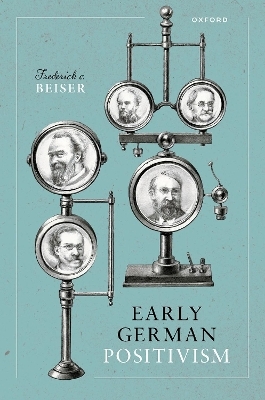
Early German Positivism
Oxford University Press (Verlag)
978-0-19-892725-9 (ISBN)
In Early German Positivism, Frederick C. Beiser explores a much neglected or forgotten period of the history of philosophy: the history of German positivism from 1860 to 1907. Almost all studies of positivism revolve around the Vienna Circle. Instead, this study covers positivism even before the first Vienna circle (1907). Beiser delves into figures almost completely forgotten in the German and Anglo-American worlds: Theodor Gomperz (1832-1912), Eugen Dühring (1833-1921), Ernst Laas (1837-1885), and Friedrich Jodl (1849-1914); he also examines Ernst Mach (1838-1916) and Richard Avenarius (1843-1896), who are much better known but contemporaries of these thinkers. Several positivist themes unite these thinkers: rejection of the synthetic a priori; opposition to pessimism; a philosophy of monism, naturalism and historicism; and the belief that the highest good can be achieved only under the guidance of science. Early German Positivism aims to place positivism in a wider intellectual context, which goes back to the Enlightenment and the opposition to the Christian tradition.
Frederick C. Beiser was born and raised in the USA. He studied in the UK at Oriel College and Wolfson College, Oxford, and then in Germany for many years, receiving stipends from the Fritz Thyssen Stiftung and the Humboldt Stiftung during that time. He has taught in many universities in the USA including Yale, Harvard, Penn, Wisconsin, Colorado, and Indiana. In 2015 President Joachim Gauck awarded him the Bundesverdienstkreuz (the Order of Merit of the Federal Republic of Germany) for his work on German philosophy. Beiser was Professor of Philosphy at Syracuse University for 22 years until he retired in 2022.
INTRODUCTION: EARLY GERMAN POSITIVISM
1: ORIGINS OF POSITIVISM IN AUSTRIA AND GERMANY
2: EUGEN DÜHRING
3: ERNST LAAS
4: FRIEDRICH JODL
5: ERNST MACH
6: RICHARD AVENARIUS
| Erscheinungsdatum | 12.11.2024 |
|---|---|
| Verlagsort | Oxford |
| Sprache | englisch |
| Maße | 162 x 240 mm |
| Gewicht | 510 g |
| Themenwelt | Geisteswissenschaften ► Philosophie ► Geschichte der Philosophie |
| Geisteswissenschaften ► Philosophie ► Philosophie der Neuzeit | |
| Naturwissenschaften | |
| ISBN-10 | 0-19-892725-8 / 0198927258 |
| ISBN-13 | 978-0-19-892725-9 / 9780198927259 |
| Zustand | Neuware |
| Informationen gemäß Produktsicherheitsverordnung (GPSR) | |
| Haben Sie eine Frage zum Produkt? |
aus dem Bereich


